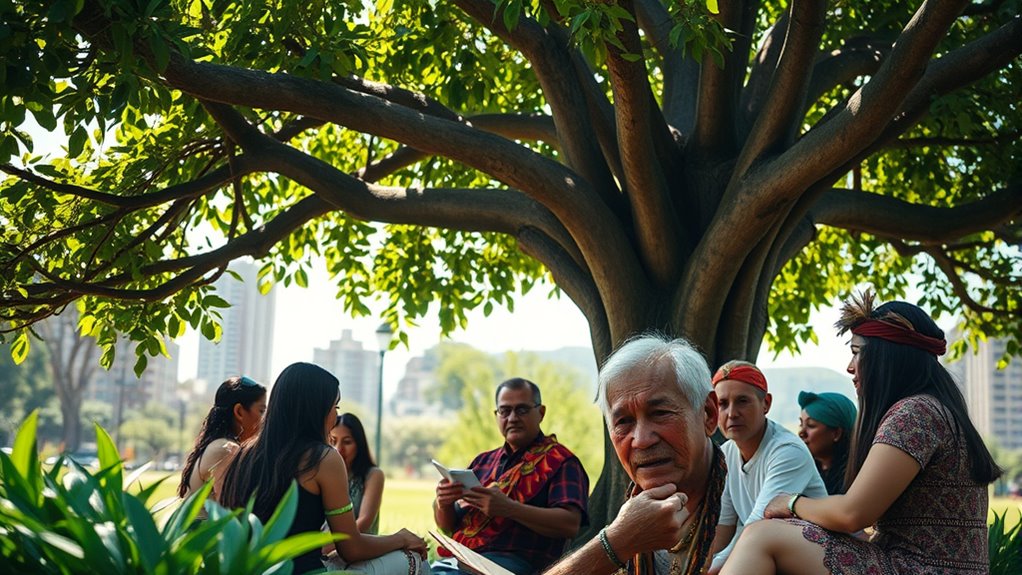Cultural perspectives on intuition show that many traditions see it as more than just a gut feeling, blending spiritual, communal, and personal wisdom. Indigenous cultures often view intuition as a sacred tool used in shamanic practices to connect with spirits and maintain harmony. Modern views tend to frame intuition as subconscious mental processing that aids quick decision-making. If you explore further, you’ll discover how these diverse perspectives weave a rich understanding of intuition across different societies.
Key Takeaways
- Indigenous cultures view intuition as sacred, connecting individuals with spiritual realms and serving as a communal wisdom passed through generations.
- Shamans rely on intuition for diagnosing illnesses and communicating with spirits, emphasizing its role in spiritual and healing practices.
- Modern interpretations see intuition as subconscious brain processing, valued for quick judgments and complex problem-solving.
- Cultivating intuition involves rituals, storytelling, nature connection, and personal growth practices across cultures.
- Both spiritual and scientific perspectives recognize intuition as a form of deeper knowledge beyond logical reasoning.

Intuition, often described as that gut feeling or instant understanding, varies considerably across cultures. In some societies, it’s seen as a divine gift or a connection to spiritual domains, while in others, it’s regarded as a subconscious process or a form of innate wisdom. When you explore different cultural perspectives, you quickly realize how deeply rooted these perceptions are in traditions and beliefs. For example, in many Indigenous cultures, intuition is intertwined with shamanic practices, where it’s seen as a essential link to the spiritual world. Shamans rely on their intuitive insights to diagnose illnesses, communicate with spirits, and guide their communities. These practices demonstrate a worldview in which intuition isn’t just a personal feeling but a sacred, collective wisdom passed down through generations. Cross-cultural beliefs often emphasize that intuition is a form of knowing that transcends logical reasoning, connecting individuals with a larger cosmic or spiritual order. In this sphere, intuition becomes a tool for healing, decision-making, and maintaining harmony within the community. Additionally, the importance of 3D effects in textile art presentation reflects how visual impact can enhance understanding and appreciation of cultural stories. Modern interpretations, however, tend to frame intuition through psychological or neuroscientific lenses, often viewing it as the brain’s ability to process vast amounts of information subconsciously. Yet, even in contemporary settings, many recognize that intuition can be powerful, especially in situations requiring quick judgments or complex problem-solving. You might notice that some people trust their instincts more than analytical reasoning, especially when the stakes are high or the data is incomplete. This shift toward scientific understanding doesn’t necessarily negate the spiritual or cultural significance of intuition but often complements it, creating a nuanced view that respects both empirical and experiential knowledge. Across cultures, the way intuition is understood and valued reveals a shared sense that it’s more than just a fleeting feeling. Whether seen as a divine gift, a shamanic skill, or an unconscious mental process, intuition holds a special place in human experience. You might find that in indigenous traditions, intuition is cultivated through rituals, storytelling, and connection to nature, emphasizing harmony with the environment and spiritual entities. Meanwhile, in Western contexts, you’re more likely to see intuition as an internal guide that can be honed through personal development, meditation, or experience. Both perspectives highlight that intuition, regardless of its cultural framing, offers a way to access deeper knowledge beyond the rational mind, fostering a sense of connection—whether to spirits, community, or one’s inner wisdom.
Frequently Asked Questions
How Do Different Cultures Define and Measure Intuition?
You might notice that different cultures define and measure intuition uniquely due to cross-cultural differences. Some traditional beliefs see intuition as a spiritual connection or a divine gift, while others view it as subconscious knowledge or instinct. You’ll find that measurement varies—from intuitive decision-making in daily life to formal spiritual or ritual practices. Embracing these diverse perspectives helps you appreciate how cultural values shape understanding and trust in intuition across societies.
What Role Does Intuition Play in Indigenous Spiritual Practices?
You see that in indigenous spiritual practices, intuition plays a vital role through dream symbolism and ritual significance. You’re encouraged to trust intuitive insights gained from dreams, which often symbolize messages from spirits or ancestors. Rituals are designed to heighten intuition, helping practitioners connect deeply with spiritual domains. By honoring these intuitive experiences, indigenous cultures maintain a profound link between inner wisdom, cultural identity, and spiritual guidance.
Are There Scientific Studies Supporting Indigenous Intuitive Knowledge?
Imagine a bridge connecting ancient wisdom and modern science. Scientific studies now explore indigenous intuitive knowledge through neuroscientific validation, revealing how the brain processes intuition. You should be aware that cognitive biases can influence interpretations, but research increasingly supports the idea that intuition isn’t just mystical—it’s rooted in neural mechanisms. This blending of science and tradition offers a richer understanding of how intuition guides humans across cultures and time.
How Has Colonialism Impacted Indigenous Perceptions of Intuition?
You see that colonialism has deeply impacted indigenous perceptions of intuition through colonial suppression and cultural erasure. These forces have marginalized indigenous knowledge systems, making it harder for communities to value and trust their intuitive practices. As a result, many indigenous people may have been led to view their intuition as less valid or misunderstood, which has caused lasting disruptions in how they connect with their cultural and spiritual traditions.
Can Modern Psychology Fully Understand Indigenous Intuitive Traditions?
Did you know that only 20% of psychological research includes diverse cultural perspectives? When you ask if modern psychology can fully understand indigenous intuitive traditions, you face significant epistemological challenges and cross-cultural differences. These traditions often rely on spiritual and communal knowledge, which modern science may overlook. So, while psychology can offer insights, it might not capture the depth of indigenous intuition, emphasizing the need for a more inclusive, culturally sensitive approach.
Conclusion
You see, intuition connects cultures, bridges traditions, and unites wisdom. It guides you through indigenous teachings and modern insights alike, revealing universal truths. It empowers you to trust your instincts, honor your heritage, and embrace new perspectives. By understanding the diverse ways intuition manifests, you deepen your awareness, expand your consciousness, and enrich your journey. Ultimately, intuition invites you to listen, learn, and grow—within yourself, with others, and across all cultures.









